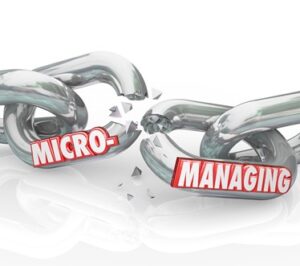An ideal workplace should be a relaxed and productive atmosphere filled with creativity, support, compassion, excellent communication, and positive values. However, many fall short of this because of Micromanaging. Micromanaging can create a toxic environment.
What is Micromanaging?
Micromanaging is over-management and an inability to delegate.
According to Oxford Languages, “micromanaging control every part, however small, of (an enterprise or activity).”
What does Micromanaging Look Like?
- Be picky about minor details of little importance.
- Frequently walk around the office to check what staff is doing at their desks.
- Take away responsibilities without justification.
- Redo an employees’ work, even when the original was correct.
- End up taking over a project after assigning it to someone else.
- Criticize a successful project.
The negative impacts of micromanaging are so intense that it is labeled one of the top reasons employees resign.
Here are the 9 Ways Micromanaging can Negatively Impact Employees:

- Heightened Stress
Too much stress can cause anxiety. People with anxiety can experience a range of physical and psychological symptoms. They may feel nervous, tense, fearful, or restless, and, in severe cases, panic attacks can occur. The National Institute for Occupational Safety and Health (NIOSH) defines job stress as the harmful physical and emotional responses that occur when the requirements of the job do not match the capabilities, resources, or needs of the worker. Job stress can lead to poor health and even injury. - Burnout
When employees continuously feel as if everything they do is scrutinized, they become frustrated, tired, and upset, leading to burnout. This can impact their work performance and prevent them from excelling in their position. - Poor health and mental well-being
The most significant adverse effect of Micromanaging is the long-term effect of stress and its impact on people’s health.According to webmd.com: Stress can play a part in problems such as headaches, high blood pressure, heart problems, diabetes, skin conditions, asthma, arthritis, depression, and anxiety.Also, chronic stress can contribute to long-term problems for the heart and blood vessels. It can increase the heart rate and the elevated levels of cortisol (stress hormone). Cortisol is essential for your health, but too much of it can wreak havoc on your body and cause several unwanted symptoms. One of the most common symptoms is excessive weight gain. - Decreased growth potential
Employees will become less motivated. They may feel that they are not given enough space for growth, creativity, and expression. Also, it will prevent team members from taking the sort of necessary risks for a startup to grow. - Low productivity
Micromanaging decreases the drive for success. Employees might meet deadlines, but their work will only be satisfactory. - Reduced creativity
How can anyone be creative in an environment that hinders creativity, expression, and communication? Creativity will be the first thing that suffers from micromanaging. To be creative, workers need to feel free to experiment, collaborate and have an “out of the box” thinking. - Low employee morale
When there is low employee morale, workers may feel down and disengaged and their work will be subpar, uninspired, and lacking innovation. - High staff turnover
Who wants to work in an unhealthy environment that everything they do is being scrutinized? Some people will stay for a while under harsh and stressful conditions when they have bills to pay and family to take care of. However, everyone has their breaking point, and it’s just so much a person can take until they decide to quit and walk away. - Engage in Unhealthy Behaviors
Workplace stress has adverse effects on workers’ mental health, with an increased risk of anxiety, burnout, depression, overeating, and substance use disorders. Workers who are stressed at work are more likely to engage in unhealthy behaviors, such as cigarette smoking, alcohol and drug abuse, and poor dietary patterns.
How to Avoid Micromanaging

- Encourage Individualism
Micromanaging create a lack of trust employees have in their leaders. By exhibiting trust, you make workers feel comfortable doing what they think is best—even if it’s not exactly how you’d handle the situation. - Constructive Criticism
When providing feedback, try doing so in ways that highlight their value.It’s also good to make the feedback a dialogue by asking for their perspective on things as well. Not only will this make them feel valued, but it will also go a long way in building rapport. - Be Compassionate
Get to know your employees and show them you care. You don’t have to become their best friends. Every so often, have a heart-to-heart chat with each one. If they confide in you about a problem, fear, or concern and you are not able to solve it, offer resources. Try to be as helpful as you can be. When you show that you care about them, they will most likely trust you.
When they know they are working for someone who cares about them, they are more likely to be less stressed and have more confidence in their work.
Managing people is one of the hardest things a leader can do. When employees are given clear direction and the necessary room to run, you’ll be amazed by what can be achieved.
Book a consultation with us now! Please do not hesitate to contact us with any questions. We would love to hear from you. Email at [email protected].
Click here https://xcelmil.com/xcelmil-coaching-and-consulting-services/ to learn more about our services.
XcelMil, LLC is a certified Minority-Woman and Service-Disabled Veteran-Owned Small Business specializing in Executive Management Consulting and Leadership Development Training.































